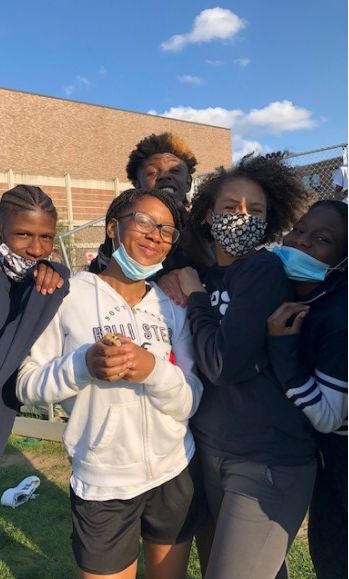In this month’s Staff Spotlight, Bri Leeper shares how she ensures her classes are student-centered and encourage academic risks. Along with serving as an English Learner Coordinator, Ms. Leeper also coaches our track and field team. She shares how she stays on top of very busy schedule with the support of her team at Legacy High.

Tell us more about your role as the English Learner Coordinator at Legacy High. What are your roles and responsibilities?
As an EL Coordinator, I act as a liaison between our multilingual learners, their families, and our school. A huge part of my role this year has been supporting other teachers in both building relationships with our English Learners in their classroom and teaching them ways to support them academically. I observe teachers, give feedback, support with lesson planning, and brainstorm ways teachers can make content accessible. Alongside my amazing co-coordinator, Ty Mendoza, we work to ensure families have a Spanish-speaking person that they can reach out to. We also check in about our students’ grades and attendance, and we cheer them on in their journey of language acquisition. I also teach an all EL Essential Literacy class where we spend a lot of time building background knowledge, learning new vocabulary, reading challenging texts, and writing.
What supports did you and your team add this year for Emerging Bilingual students?
For our students, we’ve worked in a few big buckets of supports by creating “non-negotiables” that all teachers at our school learn about and work to implement. These include creating student-facing materials with translation in their home language, identifying key vocabulary from our content to teach to students, using a star system that our fantastic SPED team created to help differentiate the amount of work students are doing, scaffolding questions we want students to respond to in English, and giving students time to practice using testing accommodations like word-to-word dictionaries, extended time, and small group testing.
How do you ensure your supports for Emerging Bilingual students and your Essential Literacy class are student-centered?
Having spent a lot of time in many Spanish classes with some fantastic teachers, I often think about what they did to help me learn the language. So when I’m creating my lesson plans, I think about how I would want this taught to me if this was all in Spanish. Also, our students like the support they’re given through challenging work. They don’t want busy work. They want to read interesting texts and think through difficult questions; I have to have the mindset that with some modeling and vocabulary support my students can all show mastery. We also spend a lot of time trying new things and making mistakes. My students usually aren’t afraid to read aloud or try new things because they see me doing the same. They watch me struggle through some Spanish and ask them for help with words and know that they can do the same when they’re working on their English.
Congrats on being named Teach Indy’s ESL teacher of the year! What are a few things that have led to your success in this role?
I think this has been the first year of my five years of teaching that I’ve really emphasized the importance of taking academic risks and learning from mistakes. Personally, for a long time, I was so afraid to make mistakes in front of my kids or seem like I didn’t have it all together because I was scared that it would cause my students to lose trust in me. At the beginning of the year, we did lessons on growth mindset and as much as I hate the buzzword-iness of that phrase, I made a commitment to my students that I would also have a growth mindset as their teacher. So we all mess up, but we learn from each other. I think when my students see that I’m willing to put myself out there and laugh at myself every now and then, they realize they can, too. Outside of my teaching, I’ve really learned a lot from my EL Team of Ty Mendoza, David Spencer, and Luke Lennon. A lot of laughter happens in our meetings too but also a lot of support, encouragement, and tough conversations about how we can do better for our students. I feel really lucky to have been empowered by my administrators in this role and to have a colleague like Ty who advocates so fiercely for our students and their families.
You also serve as the head Track & Field coach! How do you balance your teaching responsibilities with your other roles?
Oh man, this has definitely been a year where I’m challenged to be on point with my organization. I think I’m pretty used to having to find balance though. I ran track in college and worked and was involved in too many clubs, so my planner was my best friend and I learned to make time, whether that meant working and writing essays at track meets or practicing alone so I could make it to evening classes. That’s kind of how it feels now. I can’t imagine my high school experience without track and so even though it keeps me really busy, it feels worthwhile. I have a great team of assistant coaches (Shelene Baiyee, Lucian Anderson, and Courtney Thomas) who help me in a variety of ways and I’m incredibly grateful for them. I’ve also learned a lot recently from both Brittany and Luke Lennon about how to organize and prioritize everything from my daily to-do list to my emails (while also finding balance in my personal life so that I’m taking care of myself, too). Really, it’s a team effort. I’m thankful for all the ways my KIPP Indy family has lifted me up and encouraged me during this time.
